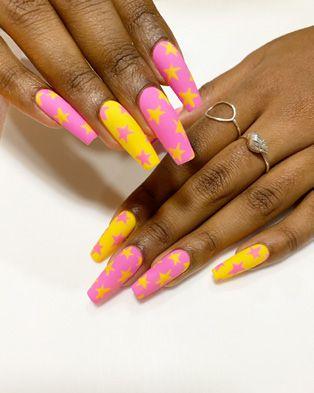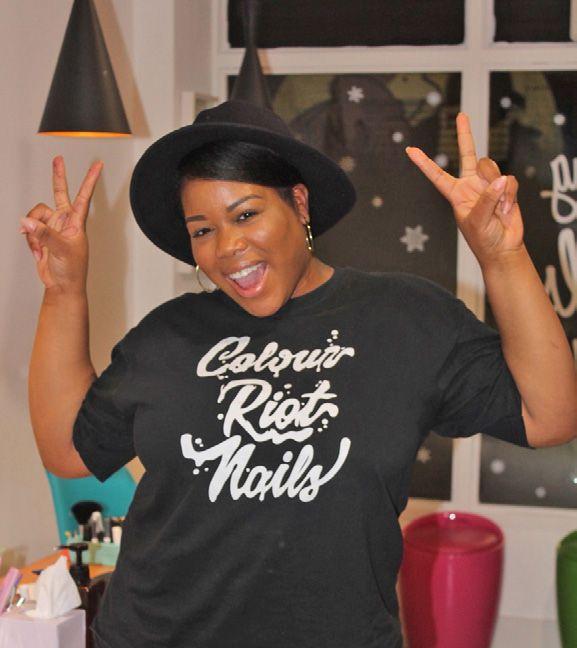
5 minute read
Is the beauty industry failing black people?


Advertisement



failing Is the BEAUTY industry black people?
We talk to Tinu Bello, chief executive of salon Colour Riot Nails in Shoreditch, London, about black representation in beauty, including what needs to change, and her experiences as a black woman working in the sector
With your experience, how do you think the beauty industry is failing black people?
“I feel like the industry is flawed from the core, which is our education, as there’s no in-depth training on black skin or black hair in the curriculum. When I was at beauty school, we were given kits with everything you needed for the subjects you were studying and the make-up products were for Caucasian skin only. The make-up course was completely tailored to white people and that was really alarming.
“The failings start when students enter the industry and that’s where we need to make sure that everyone is catered for – in the imagery, social media posts and PR, right through to the products used, because at the moment black people are just not represented. It’s also about redefining what we call qualified because students leaving school are only educated in Caucasian skin, so how are they fully qualified? You don’t walk into the industry and there’s only one type of skin you’re going to treat.
“It’s just a really narrow way of teaching and an update is long overdue. I feel through re-education and updating the curriculum then things will start to change, the black community will be more represented.”
What are your experiences as a black business woman working within the sector?
“I’ve experienced all sorts of challenges. With my nail salon business Colour Riot Nails, most of the challenges have stemmed from recruitment. I feel like there is a stigma attached to black-owned businesses where we’re seen as untrustworthy or like we don’t run our salons properly. I’ve even had a message from someone
who was meant to be coming in for an interview who said, ‘I don’t work for people of your colour’.
“In reference to my personal career, I’ve always felt like I was passed over when it came to jobs and that is has taken me longer to elevate myself in the industry in comparison to my white counterparts. It just feels like the opportunities are always limited and that feeling stems from black people not being represented in loads of things such as editorial, marketing imagery, and social media feeds. We’re not given that platform.
“I’m really blessed to have got where I have, especially landing session work, but on my journey to get there. I found that doors were always being shut in my face, and I never knew why. As a sector, we definitely need to look at how we’re employing and how we’re setting the standards for different pathways into the industry.
“Another hard thing is trying to join Fashion Week teams – getting a ‘no’ season after season and knowing it’s due to the colour of your skin because when you look at their team there’s no black people on it. You want the experience but you don’t get the chance.
“It’s the same when going to industry awards. I’ve been and I was the only black person there. It’s the worst thing when you walk into a room and there’s no one who looks like you. It’s just a thing of wanting to feel comfortable. If you are a black tech or business owner, please do apply for beauty awards. Let’s represent.”
How can we move forward as an industry to celebrate and amplify black people?
“It’s about anyone with a platform looking within their internal structures because only then can you really represent us. If you have no one in your internal structure who is black then it’s almost like out of sight, out of mind. Have us represented so we can help you.
“It’s also about re-education. We all need to re-educate ourselves on what’s wrong and what’s right, and not to be rude, but I don’t feel like this is rocket science. Brands need to really listen to their conscience and act accordingly. For example, with social media, make sure you’re giving us the opportunity to shine –



when we tag your brands in posts, support us, don’t overlook us. We post because we love the brands and we enjoy working with them, so if we can show that love then I feel like it should be reciprocated.
“I’m thankful now that brands are holding up their hands and being transparent with it, which is excellent. I just hope after this that we do see true change, that it’s not just something that’s trending. I hope all the energy that’s being portrayed online to support black people is being portrayed offline too.
“However, there are certain brands that have been a bit quiet during the Black Lives Matter movement which the community would love to hear from because we use them and stock them in our salons. It would be good to get some sort of support from them.”
What can salons and spas do to make their businesses more inclusive for black people?
“It’s about letting the black community know that you cater to us. A lot of businesses don’t portray that, and going forward we need to make that a priority. I would love to book somewhere near my house but that’s just not the case at the moment; I’m always having search to find salons that specialise in black skin and hair. It would be nice to know that I could walk into any salon and all the services would be available to me. “We, as high-street businesses, have to make sure that we’re catering to everyone, so put it in your branding, mention it on your website, stock products made for us and make sure that the team you employ in salon is diverse. “There is a stigma when it comes to employing black people and we need to get rid of that, and that’s only going to happen if you trust us and employ us.” PB










